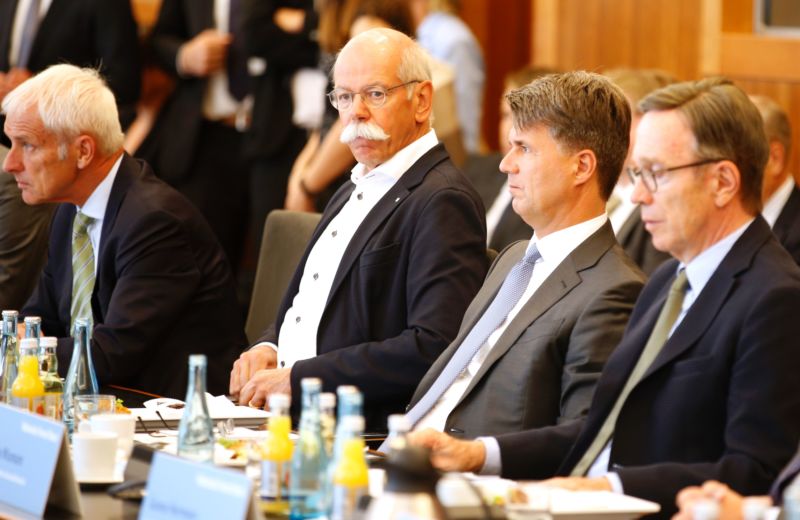
On Friday, the European Union Commission accused BMW, Daimler, and Volkswagen Group (which makes VW, Audi, and Porsche vehicles) of colluding to limit emissions reduction technology in their diesel and gas vehicles.
The commission accused the three manufacturers of coordinating to limit the size and refill ranges of AdBlue tanks on their diesel vehicles made between 2006 and 2014. AdBlue is a urea-based liquid that is injected into exhaust gas to reduce the amount of nitrogen oxides (NOx) that are released during diesel combustion.
The commission also accused the three manufacturers of agreeing to avoid or delay the introduction of “Otto” particulate filters on gas-powered vehicles between 2009 and 2014.
Concerns about collusion
After opening an investigation last September, the EU Commission today sent the three German automakers Statements of Objections, that is, a formal letter outlining the preliminary view that the manufacturers’ behavior was illegal.
“Such market behavior, if confirmed… would violate EU competition rules prohibiting cartel agreements to limit or control production, markets or technical development,” an EU Commission press release read.
The potentially illegal activity isn’t related to Volkswagen Group’s diesel scandal that broke in 2015. In that debacle, the automaker illegally told governments that its diesel vehicles were better at reducing harmful emissions than the vehicles actually were. This time, the EU Commission isn’t accusing BMW, Daimler, or VW Group of violating any environmental laws (though their alleged actions likely had significant environmental impacts). Instead, the commission is accusing the auto manufacturers of violating laws pertaining to competition among different firms.
BMW, Daimler, and VW Group have the opportunity to reply to the EU commission’s statements in writing and request an oral hearing. If “the Commission concludes that there is sufficient evidence of an infringement, it can adopt a decision prohibiting the conduct and imposing a fine of up to 10 percent of a company’s annual worldwide turnover,” the EU Commission wrote.
According to Reuters, Daimler was a whistleblower, informing the commission that collusion was taking place. The news outlet reported on Friday that Daimler believes it will not be fined for any wrongdoing due to its role as whistleblower.
The EU Commission’s accusations pertain to NOx emissions in diesel vehicles and particulate emissions in gas vehicles, but automakers will likely have to scramble to meet European Union CO2 emissions standards by 2021 as well. The average fleetwide CO2 limit for EU vehicles will decrease by 40 grams of CO2 per kilometer in just two years. According to an analysis tweeted by Car Industry Analysis, nearly a dozen automakers selling vehicles in Europe would face stiff fines were the 2021 CO2 restrictions in place today.
https://arstechnica.com/?p=1486995

